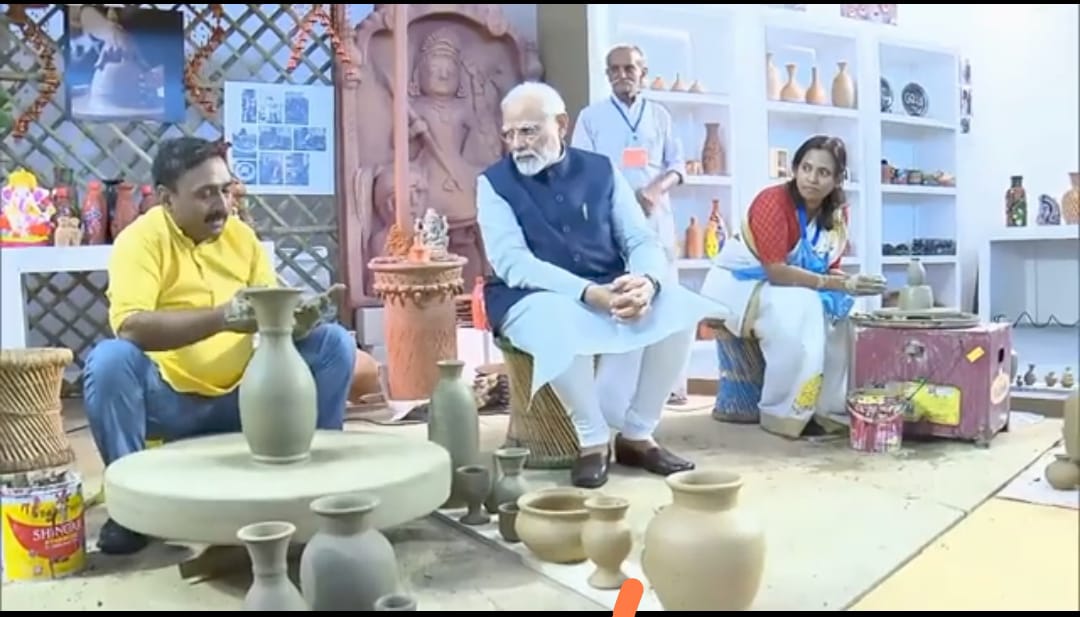

PM Modi with artisans after launching Pradhan Mantri Vishwakarma Scheme at the India International Convention Center
Prime Minister Narendra Modi has launched the Pradhan Mantri Vishwakarma scheme—a novel initiative to incentivise India’s traditional artisans in a bid to preserve the country’s rich heritage and civilizational roots.
The scheme, which will ride on a Rs.13000 crore outlay is fused with the Prime Minister’s vision of Amritkal—a quarter century era that will yield India’s transition to developed nation by 2047, marking 100 years of the country’s independence. The mainstreaming of India’s treasure trove of heritage products, will impart a unique identity to a fully developed India.
Under the Pradhan Mantri Vishwakarma scheme, the traditional craftsmen will be drawn into the digital age. For instance, they will be registered on the PM Vishwakarma portal through biometric verification. They will be given an ID card and a PM Vishwakarma certificate; tools that will help them in commercialising their products.
In view of imparting global competitiveness, the artisans will receive basic and advanced skill training, apart from a toolkit incentive of ₹15000. They will be empowered with free credit support up to Rs.1 lakh without any collateral. A second Rs. 2 lakh credit tranche will also be provided at a nominal interest rate of 5%. The craftsmen will be familiarised with digital and online transactions.
Despite the focused attempt to loop artisans in digital practices, the scheme will also encourage the traditional Guru-shishya parampara for imparting traditional skills.
As a result of pursuing a holistic approach, the Vishwakarmas will be integrated in the domestic and global value chains.
The PM Vishwakarma Scheme, which followed the Prime Minister’s address during his August 15 Independence Day address will cover 18 traditional crafts.
These include Basket/ Mat/ Broom Maker/ Coir Weaver, fishing net maker, tailor (Darzi), washerman (Dhobi), garland Maker (Malakaar), Barber (Nai), Doll and Toy Maker (Traditional), Mason (Rajmistri), Cobbler (Charmkar/ Shoesmith/ Footwear Artisan), Sculptor (Moortikar/Stone Carver), Stone Breaker, Potter (Kumhaar), Goldsmith (Sonar), Locksmith, Hammer and Tool Kit Maker, Blacksmith (Lohar), Armourer, Boat Maker, Carpenter (Suthar).
The Ministry of Micro, Small and Medium Enterprises (MSMEs) will steer the scheme.
Also Read: Tribal art and craft mesmerises PM Modi, G20 leaders and delegates
Prime Minister Narendra Modi is set to flag off the Vande Bharat Express connecting Patliputra…
Ranked 4th among the world's five largest economies, India holds a critical position in shaping…
Ahead of the International Day of Yoga, Saima Wazed, Regional Director for WHO South-East Asia…
The Indian Army, in collaboration with Indian diplomatic missions and cultural centres, is commemorating the…
The Elon Musk-headed SpaceX's newest Starship exploded ahead of a routine engine test in Texas,…
Taiwan's Ministry of National Defence (MND) stated that it detected 50 Chinese military aircraft and…